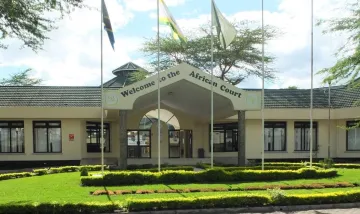
African Commission on Human and Peoples' Rights
The African Charter established the African Commission on Human and Peoples’ Rights. The Commission was inaugurated on 2 November 1987 in Addis Ababa, Ethiopia. The Commission’s Secretariat has subsequently been located in Banjul, The Gambia.In addition to performing any other tasks which may be entrusted to it by the Assembly of Heads of State and Government, the Commission is officially charged with three major functions:
Protection of human and peoples' rights

Promotion of human and peoples' rights

Interpretation of the African Charter



The African Court on Human and Peoples’ Rights (the Court) is a continental court established by African countries to ensure the protection of human and peoples’ rights in Africa. It complements and reinforces the functions of the African Commission on Human and Peoples’ Rights. The Court was established by pursuant to Article 1 of the Protocol to the African Charter on Human and Peoples’ Rights on the Establishment of an African Court on Human and Peoples’ Rights, (the Protocol) which was adopted by Member States of the then Organization of African Unity (OAU) in Ouagadougou, Burkina Faso, in June 1998. The Protocol came into force on 25 January 2004. The 32 States which have ratified the Protocol are: Algeria, Benin, Burkina Faso, Burundi, Cameroon, Chad, Côte d’Ivoire, Comoros, Congo, Democratic Republic of Congo, Gabon, The Gambia, Ghana, Guinea-Bissau, Kenya, Libya, Lesotho, Mali, Malawi, Mozambique, Mauritania, Mauritius, Nigeria, Niger, Rwanda, Sahrawi Arab Democratic Republic, South Africa, Senegal, Tanzania, Togo, Tunisia and Uganda.
To date, only eight (8) of the thirty-two (32) State Parties to the Protocol have deposited the declaration recognizing the competence of the Court to receive cases directly from NGOs and individuals. The eight States are: Burkina Faso, The Gambia, Ghana, Guinea-Bissau, Mali, Malawi , Niger and Tunisia.*
*Rwanda withdrew its declaration in 2017; Tanzania in 2019; Côte d’Ivoire and Benin in 2020.
*During its 58th Ordinary Session, the Court adopted new Rules which came into force on 25 September 2020.

